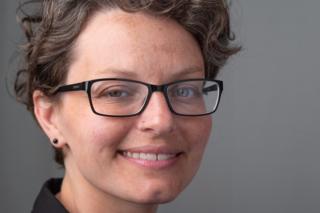What inspired you to run for public office?
I began attending local city council meetings to have a say about the police budget here in South Portland. Soon after, I became aware of the seat in my district going up for election. Receiving some encouragement from friends and community members, I decided to challenge the incumbent and run. I believe that running and bringing a voice to local government about race, gender, class, etc., is part of doing the work that white people, especially white women, are being called to do.
Do you have any previous experience in politics?
I don’t have any experience and am going into this quite green — and that's ok. I learn fast, and I’m dedicated to doing the work. Honestly, I wasn’t expecting to win at all! And being in a grad program, working, and navigating a pandemic and other life things, I gave what I could to my campaign. I did several interviews with local publications, managed social media pages, and relied on friends and supporters to spread the word. I must say, even in our technological age, word of mouth is still very valuable. Then I just let it go. On election day, I went to work, went and voted, and then sat by a fire outside with some friends and had snacks.
What does winning this election mean to you?
It's interesting because I don’t take this win personally. I believe I won because the people of South Portland want something different and someone different to be a voice for the community. The status quo and normative representation are being challenged worldwide, and small towns like South Portland are no exception. I feel honored to be elected and am very grateful for all the support.
Is there anything specific that you'd like to achieve while in office?
Yes, many things. I would like to work on antiracism policies across the board, such as in the council, in schools, and anywhere else that is applicable, which is really everywhere. I would also like to continue defunding the police and allocating funds to social services in the area.
The status quo and normative representation are being challenged worldwide, and small towns like South Portland are no exception.
Also, South Portland has two significant issues it's facing, clean air and green spaces. I want to work closely with organizations that are doing work to keep oil companies here accountable and rid the air of pollution. And I want to see green spaces preserved and work to have Indigenous voices in these conversations. At this moment, it is mostly white colonizer voices having a say about a land that is not ours — the rightful owners of this land we all live on must be involved.
How has Simmons prepared you to take on this new role?
The education I’m getting at Simmons is essential and invaluable to the work I have before me on the City Council. I’m taking a “Policy Theory and Analysis” class this semester, and it’s foundational to what I’ll be doing. At Simmons, I’m developing the critical voice I need and the knowledge to back myself and others up. Without Simmons, I wouldn’t have run, and I wouldn’t have felt qualified. I am very grateful for the education and the support of my professors and cohorts here at Simmons.
Why did you choose to pursue a master's in gender and cultural studies?
I have a minor in women and gender studies from the University of Southern Maine in Portland. After taking an intro to women and gender studies, I added it as a minor because this particular class literally transformed my life. This course presented so much language that helped me understand my internal landscape in a transformative way. So, I knew I wanted to continue with this knowledge, either in academia or art. I’m very happy I chose the gender and cultural studies program at Simmons because of the education I’m receiving and the opportunity to intersect my artistic practice.
Why did you choose to attend Simmons?
I chose Simmons for multiple reasons. It's reputation, the fact that it is a woman-centered college, it's location to Maine (therefore making commuting manageable), the opportunity to intersect my art practice — and really, the literature class offered about Toni Morrison. This course really piqued my interest, however, what is ironic is that my schedule has not worked out to actually be able to take the course! But it's ok — I’ve been led to an excellent program for which I’m incredibly grateful.

